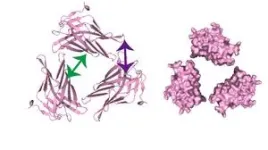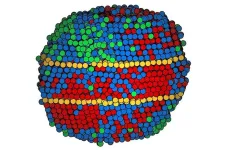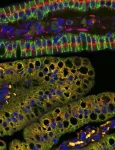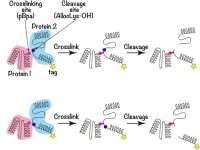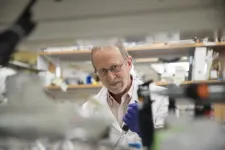(Press-News.org) The human brain continues to be built after we are born for far longer than previously recognized, suggests research by Shawn Sorrells, assistant professor of neuroscience in the Kenneth P. Dietrich School of Arts and Sciences. Sorrells’s research on postnatal brain development, published today inthe journal Nature, shines light on fundamental processes that contribute to the development of important brain functions, such as learning, memory and spatial navigation.
The new research suggests that a subset of inhibitory neurons within the entorhinal cortex, or EC -- an area of the brain essential for forming memories -- continue to migrate into this region where they build new neuronal connections from birth through toddlerhood. The study suggests that extensive postnatal neuronal migration across the EC might underlie critical neuroplasticity periods during which the brain is especially receptive to changes and adaptations. The discovery also points to a possible reason why EC neurons are more susceptible to neurodegeneration, since other recent studies have found that this same type of neuron is impacted early in Alzheimer’s disease.
By analyzing brain samples that were provided, in part, by the epilepsy tissue bank at UPMC Children’s Hospital and the Neuropathology Department at UPMC Presbyterian Hospital, Sorrells' research team was first to show that, unlike what was previously thought, neuronal migration of such scale and duration is extensive within regions that control thoughts and emotions. The discovery offers an explanation for how the human brain makes billions of new neurons over a very short time span through a mechanism that allows neurons to continue arriving after birth.
“It is generally thought that the brain is done recruiting neurons by the time an individual is born,” said Sorrells. “We were incredibly excited to learn that not only does large-scale neuronal migration continue into specific brain regions, but that this process also continues into ages when children are crawling and beginning to walk.”
END
Integrating research and clinical care to uncover secrets of brain development
Extensive neural migration continues after birth
2023-12-20
ELSE PRESS RELEASES FROM THIS DATE:
Meet 'Coscientist,' your AI lab partner
2023-12-20
In less time than it will take you to read this article, an artificial intelligence-driven system was able to autonomously learn about certain Nobel Prize-winning chemical reactions and design a successful laboratory procedure to make them. The AI did all that in just a few minutes — and nailed it on the first try.
"This is the first time that a non-organic intelligence planned, designed and executed this complex reaction that was invented by humans," says Carnegie Mellon University chemist and ...
3D atomic details of next-generation alloys revealed for first time
2023-12-20
Alloys, which are materials such as steel that are made by combining two or more metallic elements, are among the underpinnings of contemporary life. They are essential for buildings, transportation, appliances and tools — including, very likely, the device you are using to read this story. In applying alloys, engineers have faced an age-old trade-off common in most materials: Alloys that are hard tend to be brittle and break under strain, while those that are flexible under strain tend to dent easily.
Possibilities for sidestepping that trade-off arose about 20 years ago, when researchers first developed medium- and high-entropy alloys, stable materials that combine ...
Catalyzing drug discovery with explainable deep learning
2023-12-20
Scientists have discovered one of the first new classes of antibiotics identified in the past 60 years, and the first discovered leveraging an AI-powered platform built around explainable deep learning.
Published in Nature today, the peer-reviewed paper, entitled “Discovery of a structural class of antibiotics with explainable deep learning,” was co-authored by a team of 21 researchers, led by Felix Wong, Ph.D., co-founder of Integrated Biosciences, and James J. Collins, Ph.D., Termeer Professor of Medical Engineering ...
Study unveils a role of mitochondria in dietary fat processing
2023-12-20
The maintenance of a balanced lipid homeostasis is critical for our health. While consumption of excessive amounts of fatty foods contributes to metabolic diseases such as obesity and atherosclerosis, fat is an indispensable component of our diet. Digested lipids supply the body with essential building blocks and facilitate the absorption of important vitamins. In a new study published in the journal Nature, a team of researchers led by Professor Manolis Pasparakis and their collaborators Professor Aleksandra Trifunovic and Professor Christian Frezza at the Excellence Cluster CECAD of the University of Cologne, and Professor Jörg Heeren ...
Protein secrets unveiled: Newl molecular insight of protein–protein interactions
2023-12-20
Researchers from Tokyo Medical and Dental University (TMDU) have developed a new technique allowing the binding interfaces on two interacting proteins to be characterized, and validated it by describing the homophilic interaction between LAMP2A molecules
Tokyo, Japan – Proteins are building blocks of our bodies, but they do not work solo. They form partners to facilitate in different biological processes that keep us going. However, analyzing how proteins interact at a molecular level can be challenging. Now, a research team from Japan reveals the secrets behind these “protein partnerships”.
In a study published recently in Protein Science, researchers ...
Alzheimer’s discovery reveals dire effect of toxic tau protein on brain cells
2023-12-20
University of Virginia Alzheimer’s researchers have discovered how harmful tau proteins damage the essential operating instructions for our brain cells, a finding which could lead to new treatments.
The toxic protein, the researchers found, warps the shape of the nuclei of nerve cells, or neurons. This alters the function of genes contained inside and reprograms the cells to make more tau.
While the protein has long been a prime suspect in Alzheimer’s and other neurodegenerative “tauopathies,” the new research from UVA’s ...
Fraunhofer USA releases Annual Research Report, Focus 2023
2023-12-20
Fraunhofer USA, a leading nonprofit research organization dedicated to applied research and development services, is proud to announce the release of its Annual Report, Focus 2023. The report underscores Fraunhofer USA's commitment to fostering transatlantic collaboration, strengthening university-government partnerships, and driving impactful technology transfer.
Transatlantic Collaboration: A Pillar of Innovation
In the pursuit of global innovation, Fraunhofer USA continues to play a pivotal role in fostering transatlantic collaboration. The annual report highlights the organization's successful partnerships with Fraunhofer-Gesellschaft research institutes, resulting in groundbreaking ...
International collaboration to improve cancer care in Sub-Saharan Africa updates resources for sixth year
2023-12-20
PLYMOUTH MEETING, PA [December 20, 2023] — The National Comprehensive Cancer Network® (NCCN®)—an alliance of leading academic cancer centers in the United States—is celebrating six years of working alongside the African Cancer Coalition (ACC), the American Cancer Society (ACS), and the Clinton Health Access Initiative (CHAI), as part of Allied Against Cancer. The collaboration was formed to support and empower the Sub-Saharan African oncology community to advance health system capacity, ...
New study sheds light on the connection between the microbiome and kidney stones
2023-12-20
A new study from Lawson Health Research Institute and Western University published in the journal Microbiome has found changes in the microbiome in multiple locations in the body are linked to the formation of kidney stones.
The human microbiome comprises trillions of microorganisms, including healthy bacteria. In recent years, research has begun to uncover its role in health and numerous diseases.
The research team examined the gut, urinary and salivary microbiomes in 83 patients who had kidney stones ...
TTUHSC researcher studies the ability of brine shrimp to thrive in high salinity
2023-12-20
Brine shrimp of the genus Artemia are small crustaceans that can thrive in environments where sodium concentrations are as high as 25% (more than eight times typical ocean sea water). Also known by the household pet trademark ‘sea monkeys,’ these animals are abundant in inland salt lakes where brine-fly larvae are the only other animals known to exist.
The mechanisms which permit brine shrimp to tolerate some of the harshest environments are only partially understood. Previously known adaptive features include a tight protective layer (integument) to avoid water loss and the increased extrusion of sodium (Na+) and chloride (Cl-) ions ...
LAST 30 PRESS RELEASES:
Kidney cancer study finds belzutifan plus pembrolizumab post-surgery helps patients at high risk for relapse stay cancer-free longer
Alkali cation effects in electrochemical carbon dioxide reduction
Test platforms for charging wireless cars now fit on a bench
$3 million NIH grant funds national study of Medicare Advantage’s benefit expansion into social supports
Amplified Sciences achieves CAP accreditation for cutting-edge diagnostic lab
Fred Hutch announces 12 recipients of the annual Harold M. Weintraub Graduate Student Award
Native forest litter helps rebuild soil life in post-mining landscapes
Mountain soils in arid regions may emit more greenhouse gas as climate shifts, new study finds
Pairing biochar with other soil amendments could unlock stronger gains in soil health
Why do we get a skip in our step when we’re happy? Thank dopamine
UC Irvine scientists uncover cellular mechanism behind muscle repair
Platform to map living brain noninvasively takes next big step
Stress-testing the Cascadia Subduction Zone reveals variability that could impact how earthquakes spread
We may be underestimating the true carbon cost of northern wildfires
Blood test predicts which bladder cancer patients may safely skip surgery
Kennesaw State's Vijay Anand honored as National Academy of Inventors Senior Member
Recovery from whaling reveals the role of age in Humpback reproduction
Can the canny tick help prevent disease like MS and cancer?
Newcomer children show lower rates of emergency department use for non‑urgent conditions, study finds
Cognitive and neuropsychiatric function in former American football players
From trash to climate tech: rubber gloves find new life as carbon capturers materials
A step towards needed treatments for hantaviruses in new molecular map
Boys are more motivated, while girls are more compassionate?
Study identifies opposing roles for IL6 and IL6R in long-term mortality
AI accurately spots medical disorder from privacy-conscious hand images
Transient Pauli blocking for broadband ultrafast optical switching
Political polarization can spur CO2 emissions, stymie climate action
Researchers develop new strategy for improving inverted perovskite solar cells
Yes! The role of YAP and CTGF as potential therapeutic targets for preventing severe liver disease
Pancreatic cancer may begin hiding from the immune system earlier than we thought
[Press-News.org] Integrating research and clinical care to uncover secrets of brain developmentExtensive neural migration continues after birth

